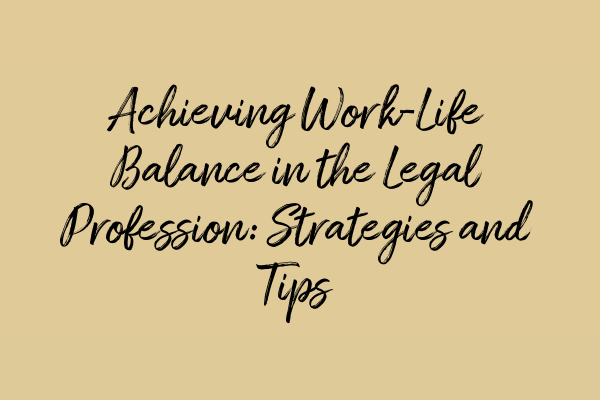Achieving Work-Life Balance in the Legal Profession: Strategies and Tips
In the demanding world of the legal profession, achieving a work-life balance can often seem like an elusive goal. With long hours, high-stakes cases, and the constant pressure to excel, it’s no wonder that many legal professionals struggle to maintain a healthy equilibrium between their personal and professional lives. However, with the right strategies and mindset, it is possible to create a harmonious balance that allows for success in both areas. In this article, we will explore some effective strategies and tips for achieving work-life balance in the legal profession.
1. Prioritize Self-Care:
Self-care is often the first thing to be neglected when work takes precedence. However, neglecting self-care can lead to burnout and negatively impact both your personal and professional life. Make it a priority to engage in activities that rejuvenate and recharge you. Whether it’s exercise, meditation, spending time with loved ones, or pursuing hobbies, scheduling time for self-care is essential for maintaining work-life balance.
2. Set Boundaries:
One of the biggest challenges in achieving work-life balance is setting boundaries. It’s crucial to establish clear boundaries between work and personal life. Determine specific work hours and stick to them as much as possible. Avoid checking emails or taking work-related calls during personal time, and be transparent with colleagues and clients about your availability. Setting boundaries will not only prevent burnout but also foster respect for your personal time.
3. Delegate and Prioritize:
As a legal professional, it can be tempting to take on every task and responsibility. However, learning to delegate and prioritize tasks is key to achieving work-life balance. Identify the tasks that are time-sensitive and require your expertise, and delegate or outsource the rest. By effectively delegating and prioritizing tasks, you can focus on what truly matters and avoid unnecessary overwhelm.
4. Improve Time Management:
Effective time management is critical for maintaining work-life balance. Utilize tools and techniques to optimize your productivity and efficiency. Breaking tasks into manageable chunks, using productivity apps, and prioritizing deadlines can help you stay organized and make the most of your time. By managing your time effectively, you can accomplish tasks efficiently and create more time for your personal life.
5. Foster Supportive Relationships:
Surround yourself with a supportive network of colleagues, friends, and family who understand the demands of the legal profession. These relationships can provide emotional support, advice, and a valuable perspective outside of work. Having a strong support system can help alleviate stress and offer a sense of balance and fulfillment in both personal and professional life.
6. Embrace Technology:
Technology has revolutionized the legal profession, making it easier than ever to work remotely and stay connected. Embrace technology tools that can streamline your work process and offer flexibility. From document-sharing platforms to virtual meeting applications, leveraging technology can help you achieve work-life balance by allowing you to work efficiently from anywhere.
7. Keep Learning and Growing:
Investing in your professional development can have a significant impact on your work-life balance. By continuously learning and growing, you can enhance your skills and knowledge, enabling you to work more efficiently and effectively. Stay updated with the latest legal developments, attend seminars, and consider additional training or certifications to position yourself for success and reduce stress in your work.
Remember, work-life balance is a journey, and it may look different for each individual. Finding what works best for you is key. By prioritizing self-care, setting boundaries, improving time management, fostering supportive relationships, embracing technology, and continuously learning, you can create a fulfilling and balanced life both inside and outside the legal profession.
Related Articles:
– Private Prosecutions: Exploring Non-Governmental Prosecutions in Criminal Cases
– Understanding Drug-related Offences: Laws and Penalties in the UK
– Demystifying Criminal Law Procedures: A Step-by-Step Guide
– Rights of the Accused: Protecting Individual Liberties in Criminal Proceedings
– Magistrates’ Court vs Crown Court: Understanding Key Differences


Leave a Reply